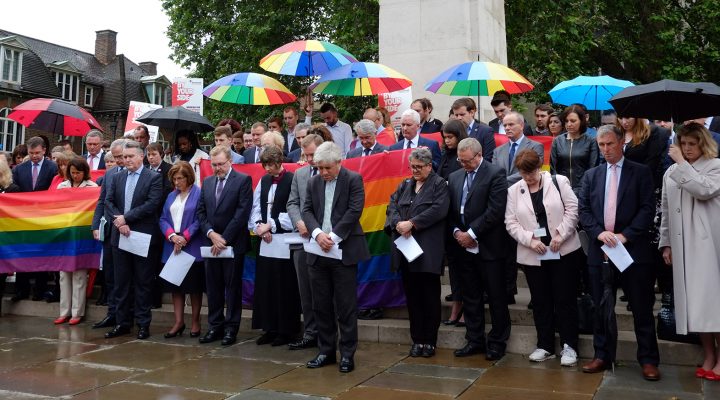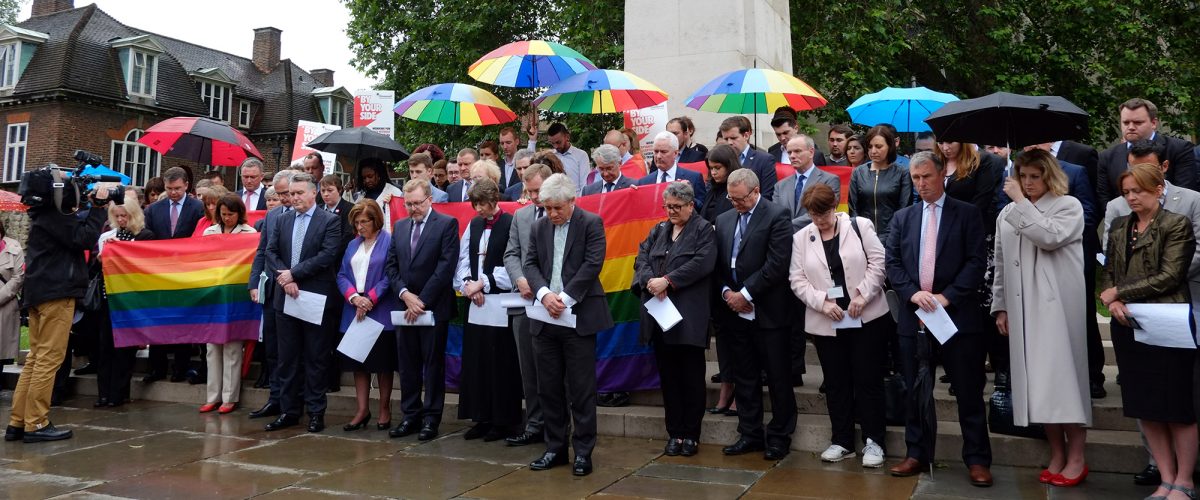There are some meetings that, when they’re over, you know your life will never be the same.
I remember pulling into a church parking lot on a Friday afternoon in September 2016 knowing in my heart I was a fish out of water. At the same time, I also knew I needed to be there. As soon as Barbara Poma, Pastor Terry and Pastor Joel Hunter walked into the room, a spirit of change filled the air.
I say “change” mainly for me in understanding the significance of the attack on innocent men and women at Pulse nightclub in June 2016 — people who were only out to have a good time and socialize with their friends. This event stands out as the second-deadliest mass shooting in American history, where a lone gunman murdered 49 people primarily because of their sexual orientation.

Pulse nightclub owner Barbara Poma (L) comforts Orlando City commissioner Patty Sheehan at the one-year anniversary memorial service for victims of the mass shooting at the Pulse nightclub on June 12, 2017. (Photo by Joe Burbank-Pool/Getty Images)
Barbara Poma is the owner of Pulse nightclub. She’s the one who invited me to this meeting, where we all made a pact we could keep the details of our conversation private. I emerged from that meeting with deep friendships and an understanding that, although we may not agree with one another, we would love and support each other.
But another thing happened to me that day. Before the Pulse nightclub massacre, I hadn’t really engaged with the LGBTQ community and, honestly, didn’t even think much of it. But because of that meeting and the new relationships formed out of it, God worked in my heart, helping me see God wanted me to embrace a group of people I had ignored.
That day, I heard stories of many of the victims whose families didn’t know they were part of the LGBTQ community. Barbara also told me about one of the victims whose family chose not to claim his body. I couldn’t imagine disowning my child and not claiming their dead body because of my disagreement about their sexual orientation.
After that meeting, Jesus showed me I no longer could sit on the sidelines. I needed to lean into the tension of my own discomfort and push back on blatant discrimination toward the LGBTQ community.
“When my friend looked me in the face and asked what he should do, one word immediately popped out of my mouth: “affirmation.’”
All this recently was put to a test. A family friend confided in me that their son is transgender and is beginning to transition from male to female. When my friend looked me in the face and asked what he should do, one word immediately popped out of my mouth: “Affirmation.”
Now I know some of you will write me off as “liberal.” But the word “affirmation” isn’t a liberal word; it is a life-giving word.
When we affirm people in the trans community, we give them life. The suicide rate for transpeople is exponentially higher than for any other group. However, for transpeople with family who affirm them, the attempted suicide rate drops by 73%.
Suicide and depression plague the transgender community. By giving words of affirmation, we give life to people, which is what I believe Jesus would want. Jesus said he came to give us “life.”
Recently, I interviewed counselor and author Lisa Damour, whose new book deals with the emotional lives of teenagers. She also has done extensive work on gender identity.
“The gender landscape has shifted a lot in recent years,” she said. “I would say that actually adolescents are very much ahead of everybody in terms of taking a much more expansive view of gender and seeing gender as vastly more fluid than previous generations.
“The thing the adults around that young person can do to protect mental health is to be affirming.”
“There’s a lot to understand,” she admitted. “I always try to ground what I recommend in the research. I try always to have my recommendations backed up by what we have discovered as scientists. What we’ve discovered as scientists is that when a kid is expressing a non-traditional gender identity, the thing the adults around that young person can do to protect mental health is to be affirming.”
I grew up in a conservative Southern Baptist community and have attended Southern Baptist schools where the word “affirming” got struck down as a liberal word. If a person kept bringing it up, they were excommunicated from the group.
Again, to affirm doesn’t mean you must agree with someone. It means you truly love them regardless of their position. It is to honor them because they are created in the image of God. And in the context of the LGBTQ community, you can affirm a person as someone created in the image of God even if you find their behavior sinful.
It isn’t our place as Christ followers to make someone into what we want them to be. Jesus is the author and finisher of all creation. He is the one who has the right to do that. However, Jesus does want us to do everything possible to love as he loved, to affirm every person as being one of God’s precious children.
When we do that, we offer life and hope to them. And we may literally save lives.
Jesus affirmed those he met — even if they had been scandalized in their communities. For example, he did this with the woman at the well. He talked with this Samaritan woman, didn’t condemn her, but opened her eyes to the reality of whose she was. That allowed the Spirit to transform her life and ultimately the lives of many in her community.
Affirmation works, and as my friend Lisa explained, it isn’t a one size fits all. Likewise, Jesus didn’t take a one-size-fits-all approach to the people he met.
Lisa explained how this works for us: “I’ve been a clinician for nearly 30 years and what a good clinician does, what a good parent does, is they consider the details and circumstances of the young person in front of them and then they use that to inform decision making. What affirming looks like is going to be really different kid to kid. There’s no one-size-fits-all answer to what affirming a young person’s gender identity looks like.”
As we approach the anniversary of one of the worst mass shootings in American history — a shooting motivated by hate — let us remember the power of affirmation.
Remember that Jesus affirms us with love before doing anything else in our lives. Affirmation gives life.

Maina Mwaura
Maina Mwaura is a freelance writer who lives in Atlanta.


